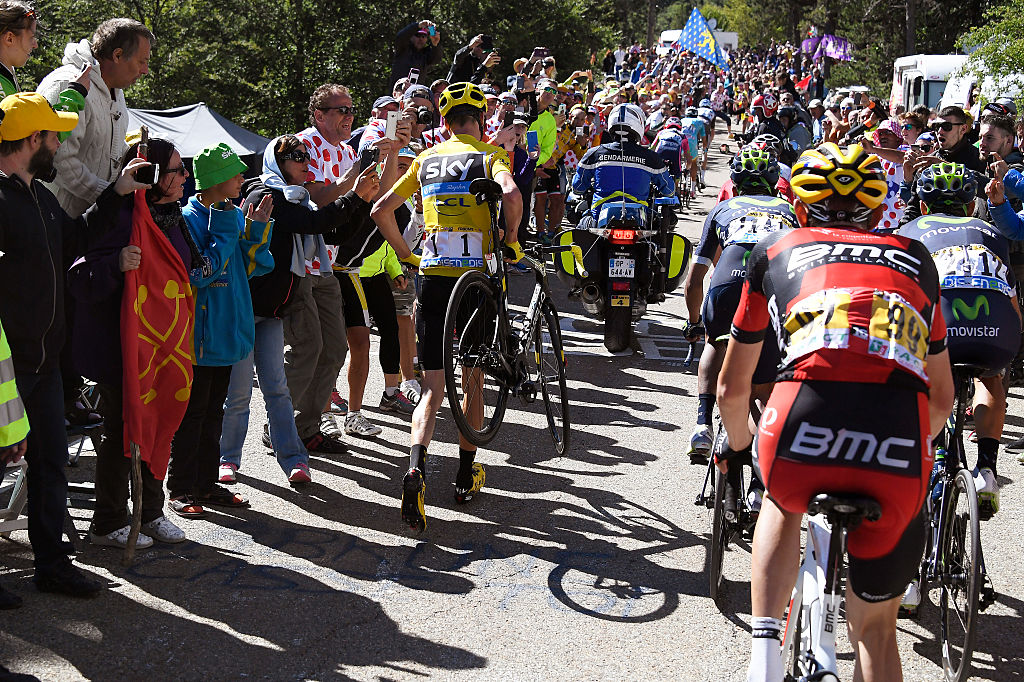Chris Froome returns to Mont Ventoux riding a different kind of Tour de France
'I'm very much hoping I can get to Paris' says four-time winner

The Tour de France's last two visits to Mont Ventoux were all about Chris Froome. In 2013, he seemed to defy gravity when he took flight and passed Nairo Quintana on the upper reaches of the mountain. In 2016, on a day that defied all logic, he took to his feet and briefly began to run towards Chalet Reynard after a crash put his bike beyond use.
Five years on, the Bald Mountain maintains its hermetic presence above Provence, but Froome's position in the geography of the Tour is rather different. Whatever happens on the Tour's novel double ascent of Mont Ventoux on Wednesday afternoon, it seems difficult to imagine that the headlines this time out will be for Froome, who currently finds himself almost two hours down on maillot jaune Tadej Pogačar.
And yet, the mountain helped to define his career and he in turn has marked the mountain's relationship with this race. 24 hours before the Tour's return to Mont Ventoux, it seemed only logical for reporters in the mixed zone in Albertville to seek out Froome.
"I've got obviously mixed feelings about going up Mont Ventoux. I had some amazing memories going up there in 2013 and some rather more distressed memories from 2016," Froome said. "But it's an important part of the Tour de France, it's one of the most iconic climbs of the Tour, it's got a long history and I'm sure it will tell its own story."
Stage 11 sees the Tour make its 17th visit to Mont Ventoux and it will be the first time since 1994 that the race scales the mountain without finishing at the summit. In a new departure, the peloton will tackle Mont Ventoux twice, first from Sault and then via Bedoin, but Froome was coy about the impact that unusual configuration might have on the day's racing.
"To be honest, I haven't really thought too much about tomorrow yet, I'm really looking one day at a time," Froome said. "We'll get through today first and then I'll think about tomorrow properly."
As the Tour approaches its midpoint, Froome lies 155th overall, some 1:52:31 behind Pogačar. Indeed, Froome's travails thus far have been such that he came through the Alps one place behind his old teammate, the green jersey Mark Cavendish, and he dropped a couple of more berths after sitting up in the finale of stage 10.
The latest race content, interviews, features, reviews and expert buying guides, direct to your inbox!
The four-time winner has been struggling to regain his vim of old since his career-threatening crash at the Critérium du Dauphiné in 2019 and long before the Grand Départ, he confirmed that he was racing the Tour with few aspirations beyond continuing his ongoing rehabilitation. A heavy crash on the opening stage in Brittany complicated an already trying Tour still further.
"I'm still quite swollen, still quite bruised on my hip and my chest as well. But it's definitely easing as each day passes and hopefully, the rest day will help as well," said Froome, who agreed with the consensus that this had been a particularly taxing opening to the Tour.
"That's been a brutal first week and not your typical Tour de France. Of course, every Tour de France is stressful in the first week, but this week was particularly more like a classic or a typical Giro start, if you like."
With the exception of Bernard Hinault, who left the sport just shy of his zenith, the Tour's multiple champions have long tended to race un Tour de trop, enduring at least one July well short of their previous highs before quietly exiting the stage. Miguel Indurain's sequence of five successive wins was broken by his 11th place in 1996, for instance, while Jacques Anquetil abandoned on his final appearance in 1966, just as Louison Bobet had done seven years earlier.
But even in that context, Froome's position is striking. Perhaps only Greg LeMond, who abandoned his last two appearances in 1992 and 1994, laboured as obviously in the anonymity of the peloton after wearing yellow in Paris. The 36-year-old Froome, however, is in the first season of a five-year deal with Israel Start-Up Nation, and he has quietly insisted that he can return and compete for the Tour during that spell.
"It's a huge victory for me just being here. Just being in the race, getting the racing in the legs, that's hugely important to me right now," said Froome, who is scheduled to race the Vuelta a España later his season. "Hopefully towards the second half of this race, I can get more involved."
Unlike in 2013 or 2016, Froome seems unlikely to be involved at the front end of the race on the mighty Ventoux. His aspirations are altogether more modest here, even if he politely insisted that his injuries would not prevent him from reaching Paris. "I'm still believing," he said. "I'm very much hoping I can get to Paris."

Barry Ryan was Head of Features at Cyclingnews. He has covered professional cycling since 2010, reporting from the Tour de France, Giro d’Italia and events from Argentina to Japan. His writing has appeared in The Independent, Procycling and Cycling Plus. He is the author of The Ascent: Sean Kelly, Stephen Roche and the Rise of Irish Cycling’s Golden Generation, published by Gill Books.